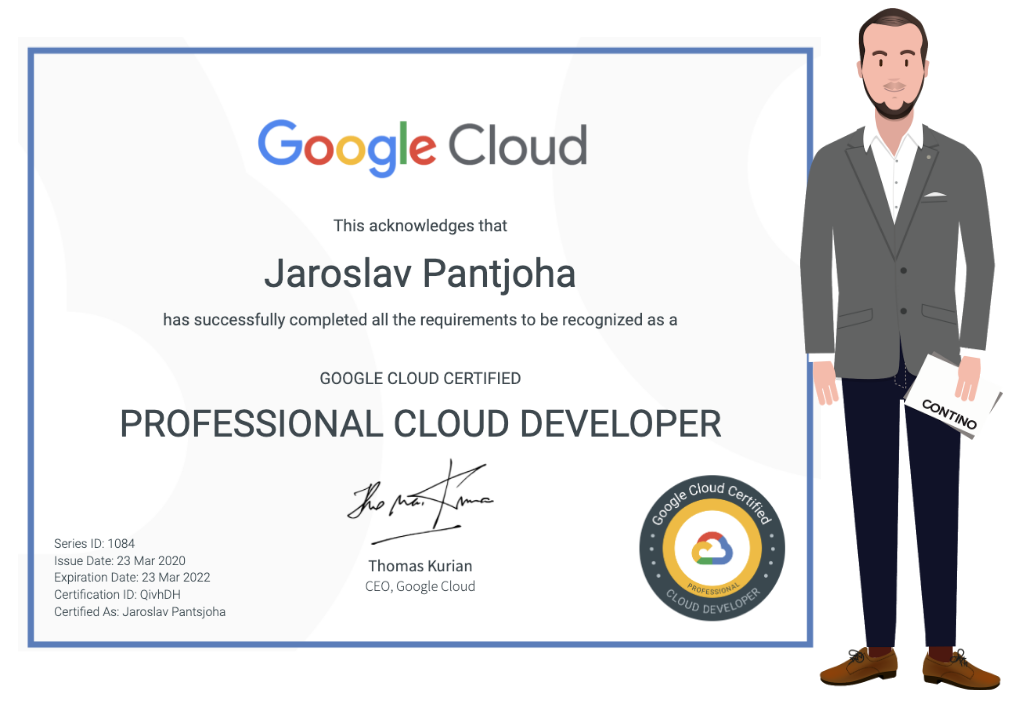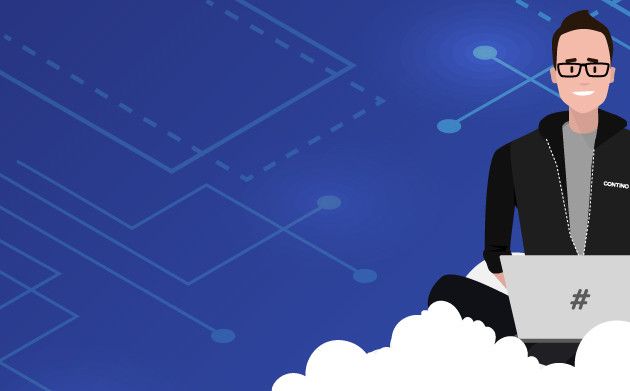How to Pass the Google Professional Cloud Developer Certification: Tips and Resources
The Google Cloud Platform Professional Cloud Developer Certification is one you ought to complete if you are considering undertaking a cloud migration and infrastructure transformation project or two.
I am very pleased and very greatfuI to have passed this exam! I found it to be a ‘medium’ on the scale of difficulty— despite working on GCP for the last three years and holding other GCP Certifications.
(If it's the latter, do get in touch — we’re hiring!)
In this blog, I’ll share some tips and resources that I found super useful in passing the exam.
The Google Professional Cloud Developer page for this exam says:
A Professional Cloud Developer builds scalable and highly available applications using Google recommended practices and tools that leverage fully managed services
This certification covers a large scope of topics within GCP, all designed to give a comprehensive skill set across application deployment processes and options best suited for any given use case, as well as relevant principles, database options, configuration features and Google Networking best practices.
This certification is a great segue into Cloud Migration Planning, whether lift-and-shift or with cloud-native refactoring strategies. It’s also relevant for anyone seeking to upgrade any existing GCP implementation, either to improve time-to-market and scalability, or to meet best practices regarding full-stack optimisation or security, networking and governance requirements.
Exam Prerequisites
It would be too easy to say “everyone is welcome” for this certification. I would advise spending time preparing for this certification if you’re going to be using these skills in the situations I outlined above. With the speed of innovation and product updates you observe with Google Cloud Product, this certification could be out of date in mere months, particularly if you’re not practising these learnings within (say) six months post-certification.
I would recommend doing this certification after:
- You have at least six months'/one year's experience working with GCP or where you have been hands-on with elements of the wider GCP product offering (i.e. App Engine, Compute Engine, BigQuery etc.)
- You already have Google’s Professional Cloud Architect certification.
- It would be most helpful if you have already done CKA or, better yet—CKAD
How to Prepare for the Exam: Tips and Resources
The minimum requirements for passing the exam are already listed on the Certification webpage.
Google Cloud is constantly moving, here are some great resources to keep you up-to-date:
- Subscribe to the Google Blog RSS feed, and keep up with announcements https://www.blog.google/products/google-cloud/
- Subscribe to Google Cloud PodCast — https://www.gcppodcast.com/
The exam itself is multiple-choice answers for all topical questions. It can be considered hard in some circumstances as some questions can be very specific to the subject matter, something you would have learned by working through the material by hand.
Here’s a good place to start: I created a YouTube Professional Cloud Developer Certification playlist with the relevant learning sessions for your commute and leisure time. This will give you a great background, and storyline even, to relate back to through your exam preparation.
Key Resources
Now, learning is best done by doing. This is the foundation piece: get started here with hands-on sessions before documentation and whitepaper reading. The content learned below will cover the majority of the exam.
- Google Qwiklabs Kubernetes on GCP Learning prep works — particularly if you have not passed the CKA/CKAD as the ideal pre-requisite I listed above
- Google Qwiklabs Security and Identity in GCP — a number of labs on identity Access Management, Virtual Private Network, Secrets Management, and Encryption and Kubernetes.
The Theory You Need to Know: Deep Dive Theory and Labs on Coursera
- Start with the basics — GCP Fundamentals in GCP — If you have any prior experience or certifications with GCP, as per my pre-requisites, you may be able to power through this in one sitting. But don’t skip it! — there are on-going updates to Google Product Offering which may leak into the revised training material
- Application Development in GCP — a fantastic piece of training material on how to design and develop cloud-native applications that seamlessly integrate managed services.
- Level up — Secure and Integrate components of your Applications in GCP — exactly what you need to ensure the migrated or now-cloud-native applications are secure, with hands-on labs to work through variety of integration methods
- Finally, Application Deployment, Performance, and Debugging — you guessed it, Stackdriver stack is the core topic here. Moreover, emphasis on infrastructure-as-code repeatable, consistent release patterns with performance optimisation and monitoring
Now, if you have completed all the above— great!— that's about 60% of the exam context covered, especially where it comes to Stackdriver. It is thoroughly covered by the sessions above. Do not underestimate the topic either. It is all Stackdriver, stackdriver, stackdriver — ensure you know each and every offering break down and appropriate use-case in multiple scenarios. Luckily that is well covered in the labs. Spend some time on agent configuration, too.
For the rest of the 40%, this is where your own experience, working knowledge or RTFM will come into play.
The Google Cloud Products You Need to Know
Here is a list of the major Google Cloud product offerings that are likely to feature in the exam alongside some helpful resources.
Firstly, don’t forget to read the documentation!:
- BigQuery — particularly the limits, SLAs, — practical labs come handy here — use cases, and integration with StackDriver, PubSub. Read the BigQuery Product Announcements . This Google Cloud Next video is really good. Play with bq: write some queries, learn the top query type calls.
- Spanner — what makes it tick? Features, import options, limits, migration use cases. This Cloud Next 19 Video very helpful. How do you provision? When would you use Spanner over CloudSQL over Firestore? See Comparison Chart Here
- Firestore/Datastore —a noSQL database for global and mobile apps. You need to understand the key features compared to other products. Limitations. Always bring it back to the use case. Work through labs with query writing (it really helps!).
- Cloud SQL — a fully managed relational database. What options you have within Cloud SQL, how do you scale, how do you adapt for throughput? Write some Queries here. What is UNNEST? What other operations can you call? This is data-exam relevant, but you’re expected to know some basic SQL operations and use cases.
- Cloud Storage — this always comes up, and in my other exams also. Be aware of the nuances between storage classes, access controls for user and application access. Also be aware of error types and the limits of writes and reads from buckets. Read up on GCS limits as well.
- BigTable — the particular innovations and features this product offers over other products in the market, and what use case could you use it for.
- Memcached — where would you use it? Ensure you are aware of the costs, compared to other products. Best use cases for this product.
- App Engine — this is a major product offering by GCP. Understand the difference between standard and flexible editions and languages supported. Key topic. Google Blog reading—Introducing App Engine Second Generation runtimes
- Managed Instance Group — how do you create templates, configuration differences, parameter calls, meta-data control? Consider you’re migrating some legacy application within MIG, which you may re-release and update to...how would you do it? Start there. Be aware of scaling options and health checks.
- Google Kubernetes Engine — a big topic in itself. CKA/CKAD beneficial here. The YAML manifest knowledge may be tested. Understand the application deployment concepts and strategies, alongside best-practice YAML configuration for your average Kubernetes deployment.
- Release Patterns — how does one release application to App Engine, versus GKE, versus Managed Instance Groups (MIG)? How do you perform Blue/Green, Rolling, and Canary? Key features and differences between these. Must know this well, well-tested component.
- Release Processes — this is about Cloud Build, Container Registries, working with the two and engineering the build, test, and release of the container images. I say this is the main reason I have done this certification to ensure my understanding is on par with best practices. There are examples of release commands tested. Read through white papers/announcements on the topic. No Anthos is known to be covered.
- IAM — the Roles, Service Accounts, JWT tokens and good knowledge of service-to-service, the user to service authentication methods. This covers a good amount of governance in terms of the folder and organizational structure best practices, but It's the foremost component well tested. Look into Identity Aware Proxy use cases as well.
- Google Endpoints — similar to Apigee but different. Quite a feature-rich product. Know what it is, and importantly what this NGINX-based proxy is for, and how authentication and authorization works.
- Data Loss Prevention API — This goes hand-in-hand with the security and governance skills— specifically implementation for improved document security controls. There are more, with VPC Service controls and Dialogflow, but the latter two are not tested to my knowledge. All good to know, of course.
- Networking — this is all about the relevance of load balances, how they are best integrated by the services (MIG, GKE) and how it compares to App Engine. SSL termination and use cases for the same in GKE, and App Engine application design. Consider you need to deploy a production-grade application and go through the process of such a delivery process, all the way to the SSL Termination. There will be additional consideration of Canary, Blue/Green — with the use of Istio, for example.
- Command Line Competency: be comfortable with kubectl — not advanced, so basics would do. Ensure you have worked with `gsutil` `gcloud` as well as `bq` — this working knowledge is expected. Work through labs!
Hands-On Practice
Firstly, I recommend attempting the practice exam. You may fail, you may not — what matters is the frame of reference this mock exam will offer you.
Secondly, you can try out this fictional case study.
It would save you lots of time on the exam if you could apply all your knowledge, and learnings you have been accumulating (as per above) to the following fictional case study.
In this scenario, you’re in charge of this cloud migration and given the following requirement: what would be the best match of GCP Cloud-Native Products to this example case study?
A number of questions will be expected to arise from this case study, so it would be wise to get this worked through in advance of the exam: Professional Cloud Developer Exam Case Study - HipLocal
Good luck!
If you keen for more deep-dive content with GCP, check-out our Contino Engineering Blog, which showcases great 'how to' challenges and solutions based on Google Cloud Platform.
That’s it! We are always looking for talented individuals to join the team here at Contino! Whether you are hands-on Azure, AWS or Google Cloud and looking for your next challenge,— we’re hiring — message or DM me if interested.
Thanks for reading, I hope this post was helpful on your certification journey!








